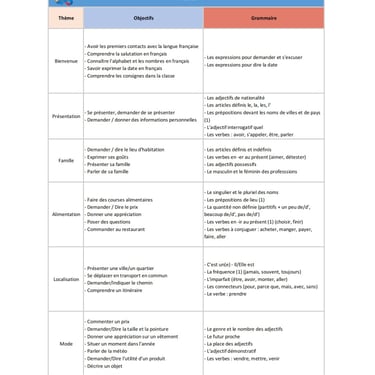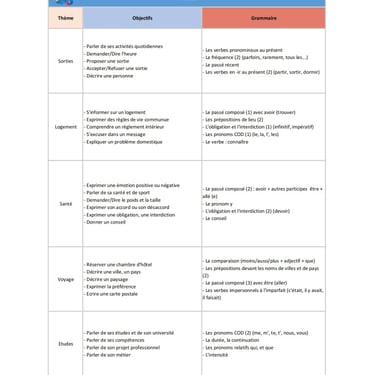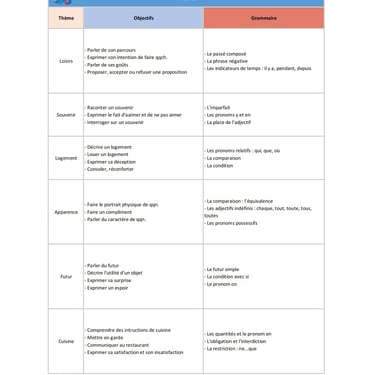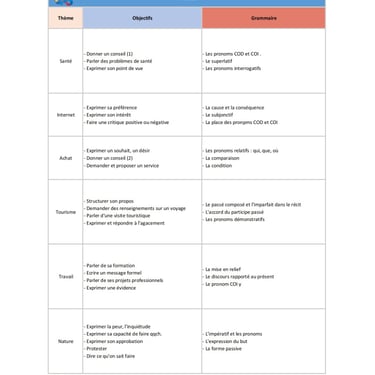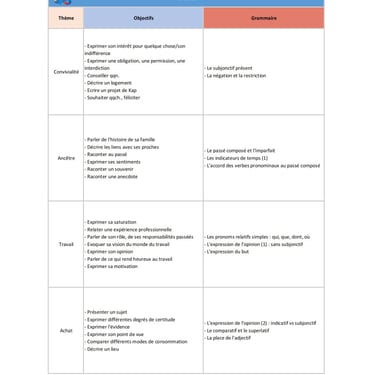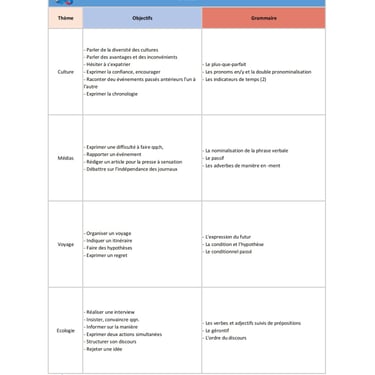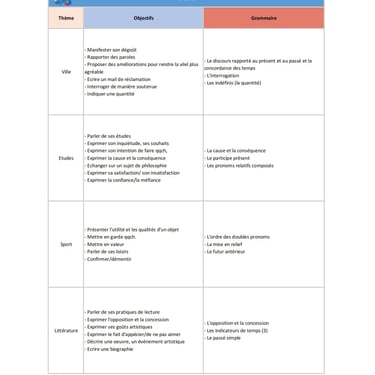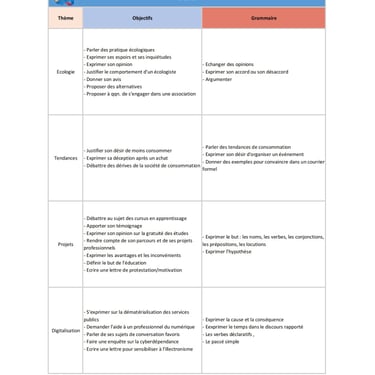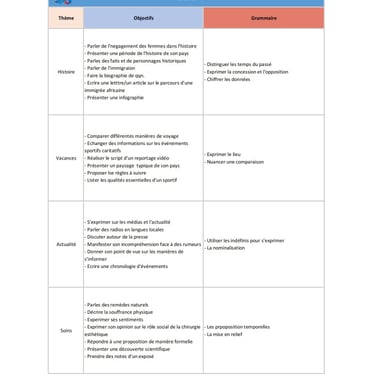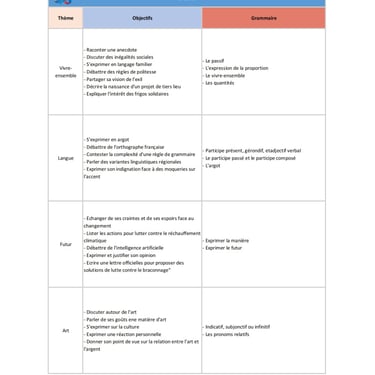Refer your friends and receive 50€ !

Course overview
Our educational approach
Action-based approach: Our teaching is rooted in an action-based approach, emphasizing real communication and practical language use. Learners are encouraged to interact, collaborate and solve concrete tasks in French, promoting authentic and motivating acquisition.
Individualization: We recognize that each learner has different needs and learning rhythms. Our courses are tailored to meet the specific objectives of each student, offering personalized pathways and a variety of materials.
Speaking, pronunciation and phonetics: We pay particular attention to speaking, pronunciation and phonetics. Specialized workshops enable learners to develop fluency and comprehensibility in spoken French.
Open-mindedness: We believe in the importance of intercultural awareness and open-mindedness. Our courses encourage the discovery of diverse French-speaking cultures and the understanding of cultural differences.
Authentic materials: The teaching materials we use are mostly authentic and reflect the reality of the language as it is used in everyday life, the media and social interactions.
Fun teaching tools and new technologies: To maintain engagement and motivation, we integrate fun teaching tools and modern technologies into the classroom. This allows learners to explore the language in an interactive and innovative way.
Synchronous online courses: We understand the importance of flexibility, which is why we also offer synchronous online courses. This enables learners to follow courses remotely, while enjoying real-time interaction with teachers and classmates.
Our educational philosophy is based on several key principles designed to ensure effective and enriching learning:
Assessment Methods
A series of assessments are offered during this session: mid-session assessments to check your progress and a final assessment to check that you have acquired the majority of your skills.
You will be awarded a total of 100 points:
● The mid-session assessment concerns a maximum of 2 skills (oral comprehension, written comprehension, oral production and written production), i.e. between 25 and 50 points. Marks are retained only if they are higher than those of the final assessment.
● 100 points in the end-of-session summative assessment (including: listening comprehension, reading comprehension, oral production and written production). Depending on the marks received in the formative assessment, 1 or 2 marks may be cancelled.
To progress to the next level, you must obtain a total of 60 points or more out of 100.
Attendance, punctuality and participation in class also determine your passage to the next level.


A1


Descriptors from the Common European Framework of Languages
I can understand a few expressions when people are talking about family, school, hobbies or the environment, and words, signs and short sentences in simple conversation if they are spoken slowly and clearly.
I can understand the main points of very basic information given in a predictable situation, such as in a travel guide, provided it is very slowly and clearly explained and there are occasional long pauses
I can understand short, simple messages sent by e-mail, on social networks or on postcards (e.g. suggesting things to do, where and when to meet up).
I can recognise names, words or signs and very basic phrases on simple notes or very basic information on most everyday situations.
I can find and understand important simple information in advertisements, event programmes, prospectuses and brochures (e.g. what's on offer, prices, date, place, departure time, etc.).
I can describe simple aspects of my everyday life or give information on private matters using a series of simple sentences, words or signs and simple phrases if I can prepare them in advance.
I can use a very short prepared text to make a repeated statement (e.g. to introduce someone formally, to propose a toast).
I can produce simple phrases and sentences in isolation.
I can answer and ask simple questions and respond to and make simple statements related to areas of most immediate need or on very familiar topics.
I can introduce myself and use basic phrases to greet and say goodbye.
I can exchange relevant information and opinions on practical problems when asked directly, provided I get help with phrasing and can repeat important points if necessary.
I can ask someone for something or give it to them.
I can talk about the weather using lexical expressions such as: next week, last Friday, in November.
Listening comprehension
Reading comprehension
Written production
Oral production


A2
Written production
Oral production
I can understand phrases and words relating to areas of most immediate relevance (e.g. very basic personal and family information, shopping, local geography, employment) provided the delivery is clear, fluent and slow.
I can follow the main idea of a demonstration or talk on a familiar or predictable topic if the message is delivered slowly and clearly, using simple language and illustrations (slides, brochures).
Reading comprehension
Listening comprehension
I can understand short, simple texts on familiar, concrete topics involving a high frequency of everyday or work-related language.
I can understand a simple personal letter, e-mail or social networking post in which the person writing talks about or asks questions about familiar matters (friends or family).
I can understand the main information in a short, simple description of a product in brochures or on a website (e.g. a portable digital device, a camera, etc.).
I can understand enough to read short stories and cartoons set in concrete, familiar situations and written in very everyday language.
I can produce a series of simple phrases and sentences linked by simple connectors such as "and", "but" and "because".
I can give a short, basic description of an event, past activities and personal experiences.
I can give impressions and opinions on topics of personal interest (e.g. lifestyles and culture, stories) using everyday vocabulary and expressions.
I can describe or describe in simple terms people, living and working conditions, everyday activities, likes and dislikes, using short phrases or sentences from a list.
I can give simple directions from one place to another using simple phrases such as "turn right", "go straight on" and connectors such as "first", "next", "and then".
I can present my point of view in simple terms provided the other person is patient. I can give a short, basic, rehearsed talk on a familiar topic.
B1
I can understand straightforward factual information on everyday and work-related topics, differentiating between general messages and detailed information, provided the speaker is clear and of a familiar variety.
I can understand the main points of an easy-to-follow monologue, such as that of a tourist guide, provided the speech is relatively slow and the language clear.


Listening comprehension
Reading comprehension
I can read clear factual texts on subjects related to my field and interests with a satisfactory level of understanding.
I can understand personal letters, e-mails and simple social media posts which describe events and experiences in some detail.
I can identify the main conclusions of texts which are clearly marked as argumentative.
I can understand most short safety instructions and simple instructions.
Written production
I can produce sustained, non-complex text on a wide range of subjects in my field, connecting a series of discrete points in a linear sequence.
I can summarise with some confidence a range of factual information on familiar current and background topics related to my field, giving an account of it and expressing an opinion.
I can give a simple review of a film, book or TV programme, using a limited range of language.
Oral production
I can produce a straightforward, uncomplicated description on a range of subjects in my field, presenting it as a linear sequence of points.
I can express clearly my feelings about something he/she has experienced and explain why I feel the way I does.
I can explain the main points of an idea or problem with sufficient precision. I can develop an argument well enough to be understood without difficulty most of the time.


B2
Written production
Oral production
I can understand standard language or a colloquial variety of it, either live or on the media, on familiar or unfamiliar topics regularly encountered in personal, social, academic or professional life. Only very loud background noise or images, inappropriate speech structure or use of idiomatic expressions can make it difficult to understand.
I can follow a speech of some length involving a complex argument provided the subject is fairly familiar and the general outline of the argument is indicated by explicit markers.
Written comprehension
Listening comprehension
I can read with a high degree of independence, adapting the mode and speed of reading to different texts and purposes and making selective use of appropriate reference sources. Has a wide and active reading vocabulary but may have difficulty with less frequent idiomatic expressions.
I can skim several texts (articles, reports, websites, books, etc.) in parallel, in my field of interest and in related areas, and I can identify what is relevant and useful in certain passages for the task in hand.
I can recognise the structure of a discursive text: arguments and counter-arguments, presentation of a problem and its solution and cause-and-effect relationships.
I can compose clear, detailed text on a wide range of subjects related to my field of interest, synthesising and evaluating information and arguments from a variety of sources.
I can produce extended descriptions of events and experiences, real or imagined, showing how ideas are related in a well-structured text and following the rules of the genre.
I can produce an essay or report which develops an argument in a systematic way, highlighting important points and relevant supporting details.
I can give a clear, detailed description and presentation on a wide range of subjects related to my field of interest, developing and justifying ideas with secondary points and relevant examples.
I can communicate complex information and recommendations on a wide range of subjects related to my field of work.
I can deal with a series of questions, after the presentation, with a degree of fluency and spontaneity that does not strain the audience or myself.
C1
I can follow a speech of some length on abstract or complex topics outside his/her field, but may need to have some details confirmed, especially if the register is unfamiliar. I can recognise a wide range of idiomatic expressions, colloquialisms and changes of register.
I can follow a speech of some length even if it is not clearly structured and even if the relationships between ideas are only implied and not explicitly stated.


Listening comprehension
Reading comprehension
I can follow a speech of some length on abstract or complex topics outside his/her field, but may need to have some details confirmed, especially if the register is unfamiliar. I can recognise a wide range of idiomatic expressions, colloquialisms and changes of register.
I can follow a speech of some length even if it is not clearly structured and even if the relationships between ideas are only implied and not explicitly stated.
Written production
I can compose clear, well-structured texts on complex subjects, highlighting the most salient relevant points and developing and confirming a point of view in a sophisticated way by integrating secondary arguments, justifications and relevant examples to reach an appropriate conclusion.
I can use the structure and conventions of a variety of genres, adapting tone, style and register to suit the target audience, text type and subject matter.
Oral production
I can give a clear talk, presentation or description on a complex topic, incorporating secondary themes and developing particular points to reach an appropriate conclusion.
I can debate a complex issue, formulating points precisely and using emphasis effectively.
I can handle objections well, responding spontaneously and almost effortlessly.
Where are we located?
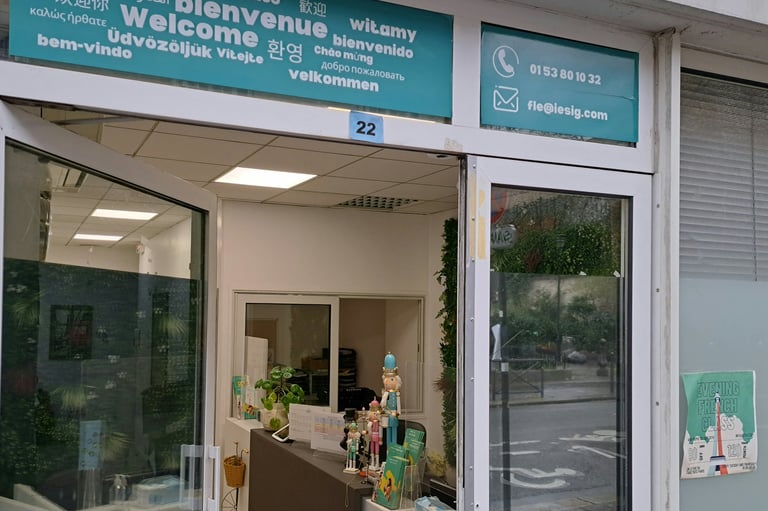

The reception of the school is open to the public during school hours from Monday to Friday from 9:00 am to 4:30 pm. Please contact us to make an appointment outside these hours.
Contacts
Tel : +33 (0) 1 53 80 10 32
Address : 20 – 22, Rue du Tage 75013 Paris
E-mail : fle@iesig.com


Cookies informations

